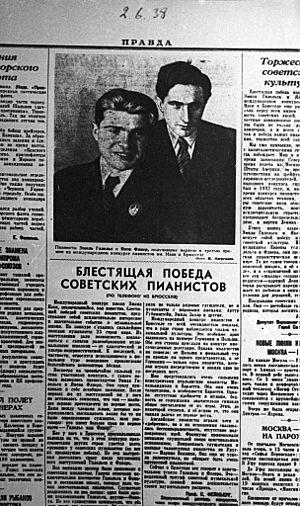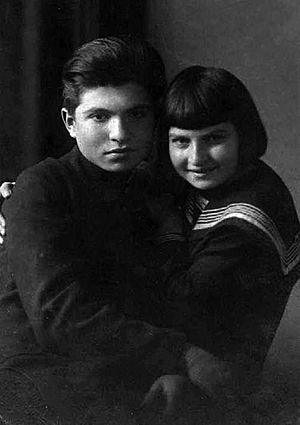Emil Gilels facts for kids
Emil Grigoryevich Gilels (born October 19, 1916 – died October 14, 1985) was a famous Russian pianist. Many people think he was one of the best pianists ever.
Contents
Early Life and Music Training
Emil Gilels was born into a Jewish family on October 19, 1916, in Odessa, which was then part of the Russian Empire and is now in Ukraine. His father worked in a sugar factory. Emil had a younger sister, Elizaveta, who became a well-known violinist.
Emil had a special gift called perfect pitch, which means he could identify any musical note just by hearing it. He started piano lessons at five and a half years old with Yakov Tkach, a famous piano teacher in Odessa. Emil learned very quickly. Within a few months, he was playing advanced studies and sonatinas by famous composers like Clementi and Mozart. Gilels later said that Tkach's strict teaching helped him build a strong foundation for his piano skills. Tkach believed that Emil was born to be a pianist and would become world-famous.
In May 1929, when he was 12, Emil Gilels gave his first public concert. Later that year, he was accepted into the Odessa Conservatory to study with Bertha Reingbald. She helped him explore other interests like history and literature. In 1932, the famous pianist Arthur Rubinstein visited the conservatory and met Gilels. They remained friends for life. Like Tkach, Reingbald was careful not to let Gilels perform too much, protecting him from stress.

In 1933, Gilels won first prize at the First All-Union Competition of Performers in Moscow. This made him famous across the Soviet Union and led to a big concert tour. However, the tour was very tiring, so Gilels went back to Odessa to finish his studies. He even turned down an offer to move to the Moscow Conservatory. He always considered Reingbald his true teacher and friend.
Gilels finished his studies at the Odessa Conservatory in 1935. Then, he joined Heinrich Neuhaus's class as a postgraduate student at the Moscow Conservatory. In 1936, he took part in his first international competition in Vienna and won second place. Two years later, in 1938, Gilels won first prize at the Ysaÿe International Festival (now called the Queen Elisabeth Competition) in Brussels. He finished his studies in Moscow in 1938.
A Brilliant Career
After his success in Brussels, Gilels was supposed to tour America and perform at the 1939 New York World's Fair. However, World War II started, and the tour was canceled.
Sergei Rachmaninoff, another famous Russian composer and pianist living outside Russia, heard Gilels play on the radio. Rachmaninoff was so impressed that he saw Gilels as his musical successor. He sent Gilels a special medal and diploma that had once been given to him to show he was following in the footsteps of Anton Rubinstein. Rachmaninoff added Gilels' name to the document, and Gilels cherished these items his whole life.
During World War II, Gilels played concerts for Soviet troops on the front lines to boost their spirits. In 1945, he formed a music group with his brother-in-law, violinist Leonid Kogan, and cellist Mstislav Rostropovich. Gilels received the State Stalin Prize in 1946. After the war, he toured countries in Eastern Europe. He also performed two-piano concerts with Yakov Flier and played with his sister, Elizaveta.
In 1952, Gilels became a professor at the Moscow Conservatory. He taught many students who later became famous pianists. He also led the jury for the first International Tchaikovsky Competition in 1958, where Van Cliburn won first prize. Gilels continued to lead this competition for many years.
Gilels was one of the first Soviet artists allowed to travel and perform in Western countries. He made his American debut in October 1955 with the Philadelphia Orchestra. His first concert in Britain was in 1952 at the Royal Albert Hall. He also performed at the Salzburg Festival in 1969.
In 1981, Gilels had a heart attack after a concert in Amsterdam. His health declined after that. He sadly died unexpectedly during a medical checkup in Moscow on October 14, 1985, just a few days before his 69th birthday.
Gilels was married twice. His first wife was pianist Rosa Tamarkina. His second wife was Fariset Hutsistova, whom he married in 1947. They had a daughter named Elena, who also became a pianist and performed with her father.
Amazing Recordings
Emil Gilels is admired for his amazing control over the piano and his beautiful, rich sound. He played a wide range of music, from very old Baroque pieces to Romantic and 20th-century classical music. He was especially known for playing works by German and Austrian composers like Beethoven, Brahms, and Schumann. But he also played pieces by Scarlatti, Debussy, Rachmaninoff, and Prokofiev wonderfully. His recordings of Liszt's Hungarian Rhapsody No. 9 and Sonata in B minor are considered classics.
Most of Gilels' recordings were made for Melodiya, the state record company in the Soviet Union. These recordings were then released in the West by companies like EMI Records and Angel Records. In 2013, Warner Classics took over EMI Classics, so they now own most of Gilels' recordings.
Gilels was working on recording all of Beethoven's piano sonatas for the German record company Deutsche Grammophon when he passed away. His recording of Beethoven's "Hammerklavier" Sonata won a Gramophone Award in 1984. He also recorded with his daughter, Elena, including Mozart's double piano concerto. He also made some chamber music recordings with violinist Leonid Kogan and cellist Mstislav Rostropovich.
Famous Recordings
- 1935 – Liszt: Fantasia on Themes from Mozart's Marriage of Figaro
- 1951 – Liszt: Hungarian Rhapsody No. 9
- 1954 – Saint-Saëns: Piano Concerto No. 2
- 1955 – Tchaikovsky: Piano Concerto No. 1
- 1955 – Rachmaninoff: Piano Concerto No. 3
- 1957 – Beethoven: Piano Concerto No. 4
- 1958 – Brahms: Piano Concerto No. 2
- 1972 – Tchaikovsky: Piano Concerto No. 2
- 1973 – Beethoven: Piano Sonata No. 23 ("Appassionata")
- 1973 – Debussy: Images, Book 1
- 1974 – Prokofiev: Sonata No. 8
- 1976 – Schubert: Trout Quintet
- 1978 – Chopin: Piano Sonata No. 3
- 1982 – Beethoven: Piano Sonata No. 29 Hammerklavier
- 1984 – Schumann: Symphonic Studies (from his last concerts in Japan)
Awards and Honors
Emil Gilels received many awards and honors for his incredible talent:
- 1st Prize, All-Soviet Union Piano Competition, 1933
- 2nd Prize, Vienna International Piano Competition, 1936
- 1st Prize, Concours Eugène Ysaÿe, Brussels, 1938
- State Stalin Prize, USSR, 1946
- People's Artist of the USSR, 1954 (a very high honor for artists)
- Three Orders of Lenin, USSR, including 1961
- Lenin Prize, 1962
- Hero of Socialist Labour, 1976 (another very high honor)
- Order of the Red Banner of Labour
- Order of the Friendship of Peoples
- Order of the Badge of Honour
- Commandeur, Ordre de Mérite Culturel et Artistique de Paris, 1967 (from France)
- Gold Medal of the City of Paris, France
- Order of Leopold (Belgium)
- Honorary Member, Accademia Nazionale di Santa Cecilia, Rome (Italy)
- Honorary Member, Royal Academy of Music, London (UK)
- Honorary Professor, Franz Liszt Academy of Music, Budapest (Hungary)
See also
 In Spanish: Emil Guilels para niños
In Spanish: Emil Guilels para niños
 | Jackie Robinson |
 | Jack Johnson |
 | Althea Gibson |
 | Arthur Ashe |
 | Muhammad Ali |


